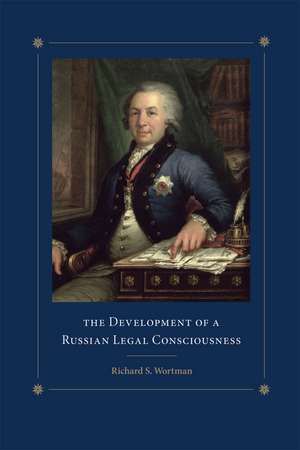The Development of a Russian Legal Consciousness
Autor Richard S. Wortmanen Limba Engleză Paperback – 14 feb 2011
Preț: 322.71 lei
Nou
Puncte Express: 484
Preț estimativ în valută:
61.75€ • 64.65$ • 51.09£
61.75€ • 64.65$ • 51.09£
Carte tipărită la comandă
Livrare economică 05-19 aprilie
Preluare comenzi: 021 569.72.76
Specificații
ISBN-13: 9780226907758
ISBN-10: 0226907759
Pagini: 360
Dimensiuni: 152 x 229 x 20 mm
Greutate: 0.53 kg
Ediția:New.
Editura: University of Chicago Press
Colecția University of Chicago Press
ISBN-10: 0226907759
Pagini: 360
Dimensiuni: 152 x 229 x 20 mm
Greutate: 0.53 kg
Ediția:New.
Editura: University of Chicago Press
Colecția University of Chicago Press
Notă biografică
Richard S. Wortman is James Bryce Professor Emeritus of European Legal History at Columbia University. He is the author of Scenarios of Power: Myth and Ceremony in Russian Monarchy, From Peter the Great to the Abdication of Nicholas II, among numerous other books.
Cuprins
Frontmatter
Abbreviations
Acknowledgments
General Introduction
I. Autocracy and the Law
1. Absolutism and Justice in Eighteenth-Century Russia
2. Buraeucratization, Specialization, and Education
3. The Composition of the Russian Legal Administration in the First Half of the Nineteenth Century
II. The Men
4. Russia's First Minister of Justice
5. The Quiet Shelter
6. Count Dmitrii Nikolaevich Bludov
7. Count Victor Nikitich Panin
8. The Emergence of a Legal Ethos
III. Reform
9. The Aspiration to Legality
10. Epilogue and Conclusion
Notes
Bibliography
Index
Abbreviations
Acknowledgments
General Introduction
I. Autocracy and the Law
1. Absolutism and Justice in Eighteenth-Century Russia
2. Buraeucratization, Specialization, and Education
3. The Composition of the Russian Legal Administration in the First Half of the Nineteenth Century
II. The Men
4. Russia's First Minister of Justice
5. The Quiet Shelter
6. Count Dmitrii Nikolaevich Bludov
7. Count Victor Nikitich Panin
8. The Emergence of a Legal Ethos
III. Reform
9. The Aspiration to Legality
10. Epilogue and Conclusion
Notes
Bibliography
Index













